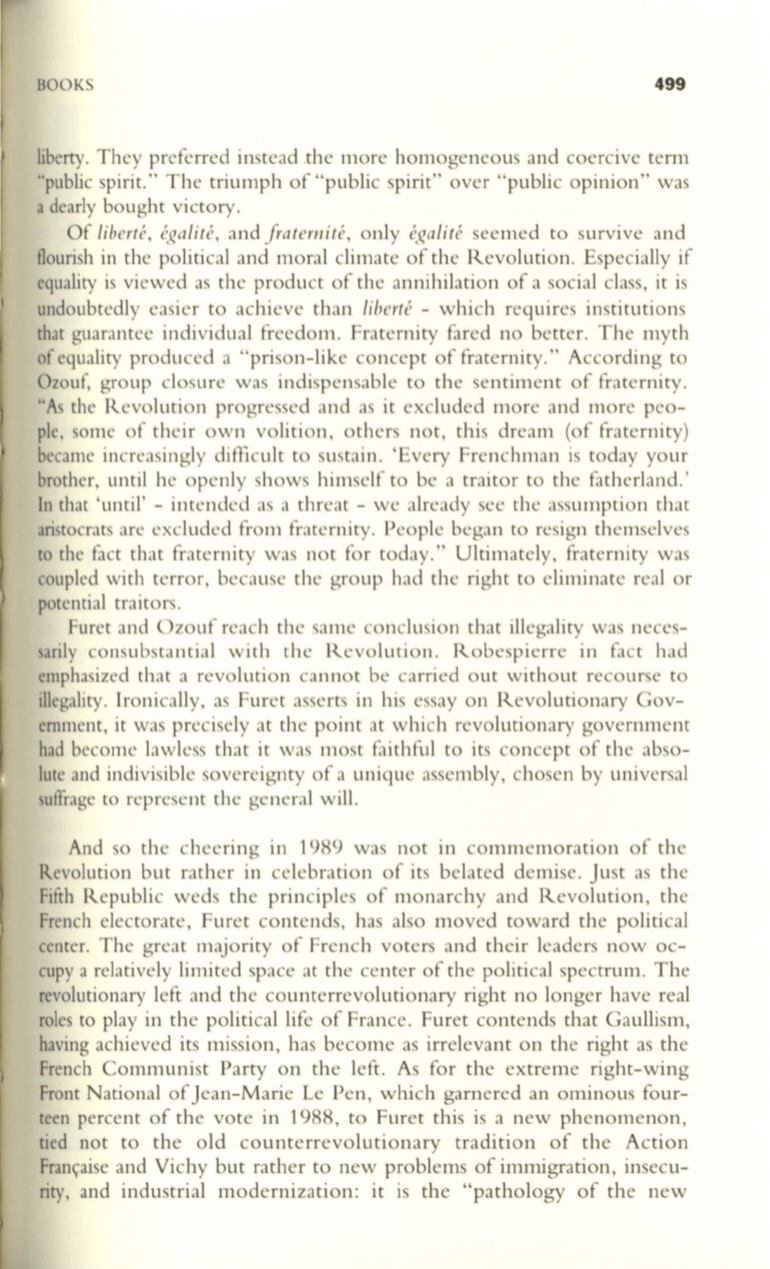
BOOKS
499
liberty. They preferred instead .the more homogeneous and coercive term
"public spirit." The triumph of "public spirit" over "public opinion" was
a dearly bought victory.
Of
liberte, egalite,
and
jrateYllite,
only
ega lite
seemed to survive and
flourish in the political and moral climate of the Revolution . Especially if
equality is viewed as the product of the annihilation of a social class, it is
undoubtedly easier to achieve than
Iib erte
-
which requires institutions
that guarantee individual freedom. Fraternity fared no better. The myth
of equality produced a "prison-like concept of fraternity." According to
Ozouf, group closure was indispensable to the sentiment of fraternity.
"As the Revolution progressed and as it excluded more and more peo–
ple, some of their own volition, others not, this dream (of fraternity)
became increasingly difficult to sustain. 'Every Frenchman is today your
brother, until he openly shows himself to be a traitor to the fatherland.'
In that 'until' - intended as a threat - we already see the assumption that
aristocrats are excluded from fraternity . People began to resign themselves
to the fact that fraternity was not for today." Ultimately, fraternity was
coupled with terror, because the group had the right to eliminate real or
potential traitors .
Furet and Ozouf reach the same conclusion that illegality was neces–
sarily consubstantial with the Revolution. Robespierre in fact had
emphasized that a revolution cannot be carried out without recourse to
iUegality. Ironically, as Furet asserts in his essay on Revolutionary Gov–
emment, it was precisely at the point at which revolutionary government
had become lawless that it was most faithful
to
its concept of the abso–
lute and indivisible sovereignty of a unique assembly, chosen by universal
suffrage to represent the general will.
And so the cheering in 1989 was not in commemoration of the
Revolution but rather in celebration of its belated demise . Just as the
Fifth Republic weds the principles of monarchy and Revolution, the
French electorate, Furet contends, has also moved toward the political
center. The great majority of French voters and their leaders now oc–
cupy a relatively limited space at the center of the political spectrum. The
revolutionary left and the counterrevolutionary right no longer have real
roles to play in the political life of France. Furet contends that Gaullism,
having achieved its mission, has become as irrelevant on the right as the
French Communist Party on the left. As for the extreme right-wing
Front National ofJean-Marie Le Pen, which garnered an ominous four–
teen percent of the vote in 1988, to Furet this is a new phenomenon,
tied not to the old counterrevolutionary tradition of the Action
Franr,:aise and Vichy but rather to new problems of immigration, insecu–
rity, and industrial modernization: it is the "pathology of the new


